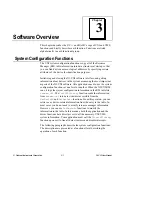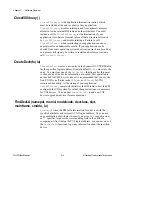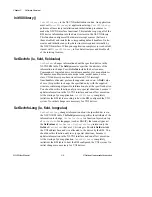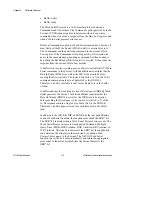
Chapter 3 Software Overview
© National Instruments Corporation
3-15
NI-VXI User Manual
A buffer write is a series of Byte Available Word Serial commands sent
to the Servant, with the additional constraint that the Data In Ready
(DIR) bit as well as the WR bit must be asserted before sending the
Byte Available command. The lower 8 bits (bits 0 to 7) of the 16-bit
command contain a single byte of data (bit 8 is the END bit).
Therefore, one Byte Available is sent for each data byte in the buffer
written.
A buffer read is a series of Byte Request Word Serial queries sent to the
Servant, with the additional constraint that the Data Out Ready (DOR)
bit as well as the WR bit must be asserted before sending the Byte
Request. The lower 8 bits (bits 0 to 7) of the 16-bit response contain a
single byte of data (bit 8 is the END bit). Therefore, one Byte Request
is sent for each data byte in the buffer read.
In addition to polling the WR, RR, DIR, and DOR bits during various
Word Serial transfers, the functions also check the ERR* bit. The
ERR* bit indicates when a Word Serial Protocol error occurs. The
Word Serial Protocol errors are: Unsupported Command, Multiple
Query Error (MQE), DIR Violation, DOR Violation, RR Violation, or
WR Violation. The Servant Word Serial Protocol functions let the local
CPU generate any of the Word Serial Protocol errors and respond to
the Read Protocol Error Word Serial query with the corresponding
protocol error. The functions automatically handle asserting and
deasserting of the ERR* bit.
The Longword Serial and Extended Longword Serial Protocols are
similar to the Word Serial Protocol, but involve 32-bit and 48-bit
command transfers, respectively, instead of the 16-bit transfers of the
Word Serial Protocol. The VXI specification, however, provides no
common command usages for these protocols. The commands are
either VXI Reserved or User-Defined. The NI-VXI interface gives you
the ability to receive and process any one of these commands.
Programming Considerations
Most of the Servant Word Serial functions require an interrupt handler.
The word serial commands must be parsed (and responded to) within
the appropriate interrupt handler. Word Serial commands Byte
Available (BAV) and Byte Request (BREQ) are handled as a special
case for reads and writes. For reads and writes, a user-supplied handler
is notified only that the transfer is complete and not for each byte
processed. Asserting and unasserting of all Response register bits
















































